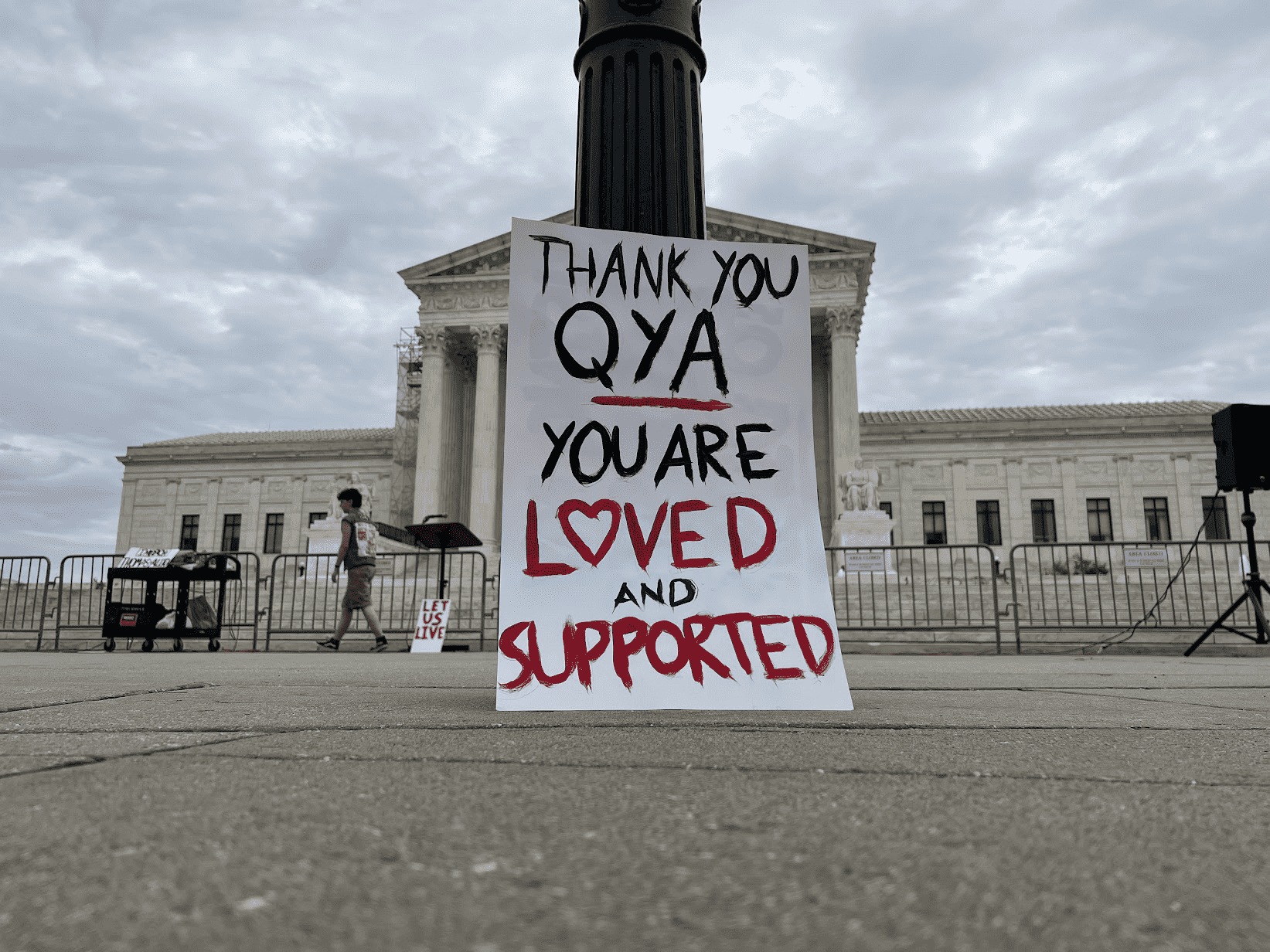In the days leading up to a protest, Xander spends his mornings sketching out poster ideas and scrolling through videos of wholesome dog memes. After reading “the daily bad news,” he tells Xtra, queer activists should seek out “cleansing energy that keeps you going.” (I ask about his favourite breeds to laugh at when stressed out; after a moment’s pause, he states: “Aussies. And Border Collies.”) Pseudonyms, first names and initials have been used throughout this article to protect the safety and privacy of the youth interviewed.
Xander, a 16-year-old trans student from Maryland, is the head of programs at Queer Youth Assemble, a non-profit that serves queer and trans youth under the age of 25. He co-organized a protest, dubbed the DC Youth Dissent, in front of the U.S. Supreme Court this past Wednesday to speak out against the slew of conservative judicial decisions from late June. The DC Youth Dissent is part of a nationwide series of protests called “We the Youth Dissent,” with protests planned in Idaho, Georgia, Massachusetts and other states.
On June 30, a Supreme Court decision gutted affirmative action, ending race-conscious college admissions. Another deemed President Joe Biden’s student loan forgiveness plan unconstitutional. The third decision rolled back LGBTQ2S+ rights by permitting a Christian web designer to deny service to potential clients on the basis of their queerness.
The Supreme Court’s rulings came as conservative lawmakers celebrated legislative wins nationwide. In recent years, GOP-led state governments have especially restricted gender-affirming care for minors—and in some cases, proposing making it a felony—at a record-breaking pace. According to the American Civil Liberties Union (ACLU), 491 anti-trans bills have made their way into legislative floors in 2023 alone. These crackdowns target hormone replacement therapy (HRT), the use of preferred pronouns at school, and surgeries. In states like Georgia, new laws also threaten to punish medical workers for providing life-saving treatment.
Xander has been at the forefront of previous youth-led protests against legislative attacks. But this time, he said, the focus is different: He and other Queer Youth Assemble organizers noticed that the Supreme Court’s rulings were proof that they “influence the culture wars” against trans youth—and youth at large.
“The overturning of affirmative action and student loan [cancellation] shows that people need to wake up and realize that the Republicans are not stopping at the harm of trans people,” he says. “[The decisions] will only help white people. The gay rights case is all about hating pretty much anyone who doesn’t fit the mould. In the end, this can and will mean disabled people, people of colour, queer people. Everyone who isn’t cis, white and Christian.”
For Xander, a student athlete, the fight to protect people who don’t “fit the mould” cuts deeper in light of discrimination against trans athletes. A Gallup survey, for one, found that 69 percent of Americans oppose trans athletes competing in sports that align with their gender identity. Even while residing in the liberal Maryland, which Governor Wes Moore declared a sanctuary for gender-affirming care, Xander described his experience on a girl’s soccer team his freshman year as one of “not feeling at home.”
“I loved the team so much, but it never felt right because I was misgendered as female. I didn’t feel safe joining the boy’s team, either, because of the toxic masculinity of men’s sports. And the boys always take their shirts off during practice. Obviously, I don’t feel safe doing that. I literally have a target on my chest, like, in the most literal sense.”
With the backdrop of the Supreme Court, Xander and his co-organizer, Edie, kicked off Youth Dissent with a series of speeches at a podium. Xander’s father, proudly holding a poster that read “THERE IS MORE THAN AN APPEARANCE OF IMPROPRIETY,” cheered from First Street Northeast as Xander criticized the affirmative action decision to an audience of around 30 people. Passersby, on occasion, walked past chanting: “Trans rights are human rights!”
“Removing affirmative action is a strategic tactic to stop the advancement of people of colour,” he argued during his speech. “As allies, it is necessary to encourage the active participation in intersectional allyship.”
Edie, a disabled asexual lesbian holding a poster captioned “LEGISLATE GUNS, NOT PEOPLE,” took the stage to emphasize the hypocrisy of the anti-LGBTQ2S+ decision amid the ongoing national gun violence crisis, which has taken the lives of more than 23,776 people in 2023 alone, according to the Gun Violence Archive.
“It’s not queer, trans humans harming us,” she says. “It’s guns. Every day, guns take the lives of innocent humans who are just trying to live and, one day, achieve their dreams.”
“Many people are proud to live in a closet because it isn’t safe to come out in this world. And no one should live in a closet!”
Shaplaie Brooks, the executive director of the Massachusetts Commission on LGBTQ Youth, then greeted the organizers and supporters with a call for the American public to “join those of us who are creating good trouble on behalf of the most marginalized.” Queer Youth Assemble was a product of the Massachusetts Commission, according to Brooks.
“[Whiteness] is a weapon of mass destruction,” she reminded supporters. “We see it here at the Supreme Court. We see it in libraries across the nation, at school board meetings and our workplaces. Our hospitals and housing, and colleges and universities.… White supremacy culture has been repackaged as white rage, white guilt, white tears, white privilege.”
The event concluded with chants. Strategically, Edie and Xander suggested to the protesters that they shout at an in-session Congress from across the U.S. Capitol Grounds, as the Supreme Court justices did not convene today. C and Z, two non-binary youth out to support the rally, whipped out their phones to scroll through their pre-planned protest ideas and waved Pride flags and led chants of their own. Most memorably, led by Z and their megaphone: “It’s our history, don’t deny it! Stonewall was a fucking riot!”
Facing down GOP-led vitriol of hate that all but seems to engorge by the day could—and does—feel all-consuming, sometimes wearying down young activists like Edie. In a pull-aside interview, however, she reminded me that the fight is not only about spreading awareness of the ongoing attacks, but to celebrate the persistence of fellow queer and disabled people, students of colour and allies.
“We don’t need to debate anybody. We know who we are.” She glanced over at Xander and another volunteer, Mittens, who were propping up posters near the steps of the Supreme Court. “I mean, look at us; aren’t we so cute?!”


 Why you can trust Xtra
Why you can trust Xtra


